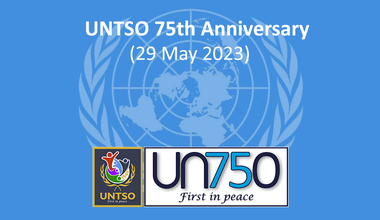In 1916, Britain and France, with the assent of Russia and Italy, entered into the secret Sykes-Picot Agreement, dividing up the Levant into mutually agreed spheres of influence and control in anticipation of an eventual partition of the Ottoman Empire. On 2 November 1917, the British Foreign Secretary announced the Balfour Declaration, the British Government’s statement of support for “the establishment in Palestine of a national home for the Jewish people.”
In December 1917, after about 400 years of Ottoman rule, Jerusalem was surrendered to British armed forces and, on 30 October 1918, the Ottoman Empire capitulated to the Allies, ending its involvement in the First World War. In November 1918, the lands of the Ottoman Empire in the Levant were partitioned into “occupied enemy territory administrations” – the British Mandate for Palestine, and the French Mandate for Syria and Lebanon.
In July 1920, British military control of Palestine was replaced by a civilian administration, headed by a High Commissioner. The British Mandate for Palestine, a legal commission of the League of Nations, came into effect on 29 September 1923, formalizing British administration of the territory. Also in 1923, Britain and France entered into the Paulet-Newcombe Agreement, or the British-French Boundary Agreement, which, to this day, legally defines the border between Israel and Lebanon.
In the aftermath of the Second World War, Britain’s control of Palestine was waning, with great loss of life and huge financial costs, to the rising nationalism of the Jewish insurgency and the Arab revolt. Consequently, Britain announced it would unilaterally terminate its Mandate for Palestine, to be effective midnight of 14 May 1948, and referred the issue of Palestine to the newly created United Nations.
The UN General Assembly Resolution 181(II) (29 November 1947) set out the partition plan with a state for the Jewish people, a state for the Arab people, and Jerusalem as a corpus separatum under a Special International Regime.
Israel declared its independence the day after the termination of the British Mandate for Palestine, and the First Arab-Israeli War ensued. Five days later, on 20 May 1948, the UN appointed Swedish Count Folke Bernadotte the ‘United Nations Mediator in Palestine’, the first official mediation in UN history. Five months later, on 17 September 1948, Count Bernadotte was assassinated, together with Colonel André Sérot of the French forces serving with the UN, by members of Lehi, a Zionist paramilitary group more commonly known as the Stern Gang.
Between late February and mid-July 1949, Armistice Agreements were signed between Israel and each of Egypt (24 February), Lebanon (23 March), Jordan (3 April) and Syria (20 July), ending the First Arab-Israeli War. The role of the Mediator supposedly complete, the functions associated with monitoring and implementing the Armistice Agreements, including the Armistice Lines, were transferred to the United Nations Truce Supervision Organization in Palestine (UNTSO).
Acting under Chapter VI of the UN Charter, and “subject to further decision by the Security Council or the General Assembly,…until a peaceful adjustment of the future situation of Palestine is reached” (UNSC resolution 54), the Security Council mandated UNTSO with “observing and maintaining the cease-fire, and as may be necessary in assisting the parties to the Armistice Agreements in the supervision of the application and observance of the terms of those Agreements” (UNSC resolution 73).
For 75 years, UNTSO has been first in peace – the first UN peacekeeping mission, the first to respond when, after the 1956 Suez Crisis, or the Second Arab-Israeli War, the UN created the United Nations Emergency Force (UNEF), where UNTSO formed the vanguard and core of the military component. First after the 1967 Six-Day War (the Third Arab-Israeli War), when Israel captured East Jerusalem, the West Bank, and the Golan. First after the 1973 Yom Kippur War (the Fourth Arab-Israeli War), when the United Nations Disengagement Force (UNDOF) was initially staffed by UNTSO. And in 1978, when Israel withdrew following its invasion of southern Lebanon, followed by the creation of the United Nations Interim Force in Lebanon (UNIFIL), where again UNTSO formed the advance force. UNTSO has also supported UN operations across the globe, setting the standard for, and providing, military observers, from Afghanistan to Yemen, in Libya, with the OPCW-UN Joint Mission to oversee and verify the timely elimination of Syria's chemical weapons, and other missions where the United Nations has recognized the value of, and deployed, military observers.
UNTSO welcomed and championed the 1979 Egyptian-Israeli Peace Treaty, and the 1994 Treaty of Peace between Israel and Jordan, as proof that the transformation of cease fires into peaceful relations is exclusively for the parties to the conflict. In that spirit, UNTSO continues to provide space for the remaining parties to the 1949 Armistice Agreements and subsequent agreements, to achieve a comprehensive solution to the Arab-Israeli conflict, through:
- the deployment of expert military observers to provide credible and impartial observation and reporting for UNDOF and UNIFIL mandate implementation, preventing the escalation of hostilities, and strengthening confidence of and among the parties; and
- proactive regional liaison, enhancing accessibility of the parties, increasing access to and analysis of information and trends, and improving cooperation and coordination within the regional United Nations presence.
For 75 years, UNTSO has symbolized the legitimacy and commitment of the United Nations to the pursuit of comprehensive peace in the Middle East. It continues to do so, and its value remains essential. Its mandate, though seemingly simple, allows the Mission to be flexible, effective, and relevant in a complex region. The value of UNTSO’s expert military observers in support of UNIFIL and UNDOF mandate implementation is undisputed. UNTSO’s regional liaison mandate allows the Mission to analyze and assess multifaceted political and security issues, and its regional footprint complements other UN missions in the region, adding strategic-level value to the over-arching goals of the United Nations.
UNTSO remains first in peace, until a lasting peace.
 UN
UN United Nations Peacekeeping
United Nations Peacekeeping

